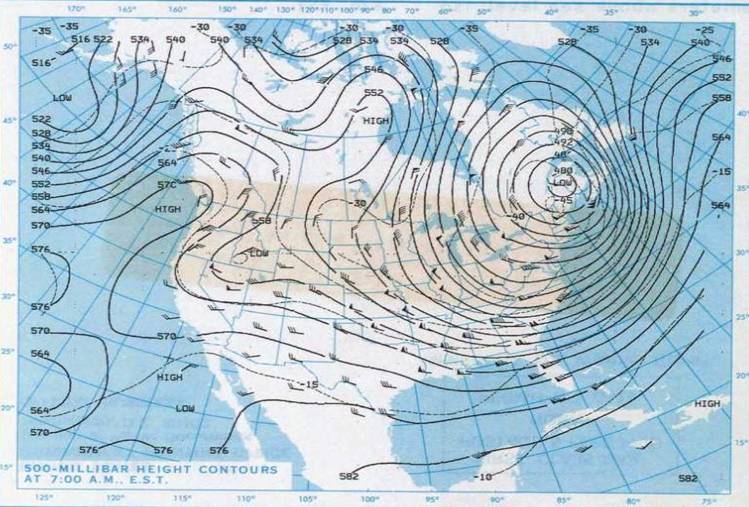N_Fiddledog N_Fiddledog:
DrCaleb DrCaleb:
A scientific 'theory' is something that fits the available data. When climatologists study wind patterns for decades and their data points to certain behaviours, that becomes a scientific theory, and 'fact'. More data can come along to update the theory, but until it does the theory stands.
Well if you want to get technical then I would say this idea melting ice is weakening the vortex and cooling the mid-west is hypothesis not theory. Hypothesis is when you notice something come up with an idea for cause then look for data to support it. If you can find the supporting data and meet the other requirements of scientific method it's a theory. Unless you can provide this support, I'm going to say they're still looking.
A Scientific Hypotheses is a theory without data. The polar weather systems have a long history of measurements with thing like weather stations, balloons and aircraft. That moves it from 'Hypothesis' to 'Theory'.
N_Fiddledog N_Fiddledog:
$1:
And I didn't say that "melting ice in the Arctic is causing the polar vortex to weaken this year". People much more in the know than me said it.
And without even looking I'll wager people much more in the know than you said that was not the case.
Sure! I'll take that bet. (because of what comes later...)
N_Fiddledog N_Fiddledog:
$1:
But you repeat yourself . . The satellite record for HadCRUT4 is 30 years long, but what about the monitoring stations and ice core records? What about GISTEMP, UAH and NCEP/NCAR? HadCRUT4 doesn't cover the poles because of it's orbit, but the others do.
http://news.nationalgeographic.com/news ... a-ice.htmlhttp://www.climatedata.info/Proxy/Proxy/icecores.htmlHuh? HadCrut4 is a land surface record and it's much longer than 30 years. It has nothing to do with satellites. The monitoring stations are incomplete. Did you not read that blog article you posted from RealClimate where they were talking about how they felt it necessary to
invent extrapolate new temperatures for the arctic, because the land surface record is incomplete?
Sorry, cut and paste error. And no, I read the original paper that you refused to admit existed, from the Royal Meteorological Society.
http://onlinelibrary.wiley.com/doi/10.1002/qj.2297/pdfN_Fiddledog N_Fiddledog:
If you're talking long term historical records such as are in your links there is evidence of much less ice at times. At one time there was a species of crocodile living in Greenland. Recent melts show old human settlements underneath the ice.
There is a Russian ice record showing a large melt just before the satellite record. There are historical records like newspaper articles talking of great arctic melts in the 1920s.
Ahh, but Greenland was also once where Africa is! Crocs be damned!
I also posted an article about a note that was left in the 1950's on Ellsmere island by a scientist with the forethought to leave measurements about a glacier knowing it would recede.
http://www.canadaka.net/link.php?id=81404What does it prove? Nothing! Like I posted in a comment earlier in the thread, I'm not here to prove jack to anyone. I just want people to see that one is not a pattern, but 100 just might be.
N_Fiddledog N_Fiddledog:
$1:
And why is that relevant? Are you going to try to prove that '1' is a pattern again?
No, but you were talking scientific method earlier when you wanted to get technical about the definition of theory and tried to pass a hypothesis off as a theory.
One of the conditions of scientific method is to pass from hypothesis to theory the supposition must show a tendency to repeat effects.
If a record melt does not produce the effect you are claiming for a year in which there was a record increase in ice extent then it is not time to call your hypothesis of ice melt causing cooling in the mid-western United states a theory. If you want to get technical, I mean.
Yes there are always cold and hot temp records being set somewhere, but that does not explain why we're all of a sudden hearing about this Polar Vortex hypothesis this year.
BartSimpson BartSimpson:
The 'Polar Vortex' is just a trendy, ominous-sounding buzzword that someone is feeding to the media to try to gin up support for the failure of global warming politics.
Because you've never heard it before does not mean it didn't exist before now. Here is a definition from the American Meterological Society, and a map of the Polar Vortex over the Eastern Seaboard in 1985. It's true that half the people you meet are of below average intellect, and most of them work for some media organization. They are going to repeat 'Polar Vortex' because they love the sound of their own voice, just like they gave up 'twerk' to endlessly repeat 'Polar Vortex'.
http://glossary.ametsoc.org/wiki/Polar_vortex
So, yes, I'll take Fiddledog's bet that the Polar Vortex cause and effect has been known for some time and is a widely adopted theory on weather patterns.

